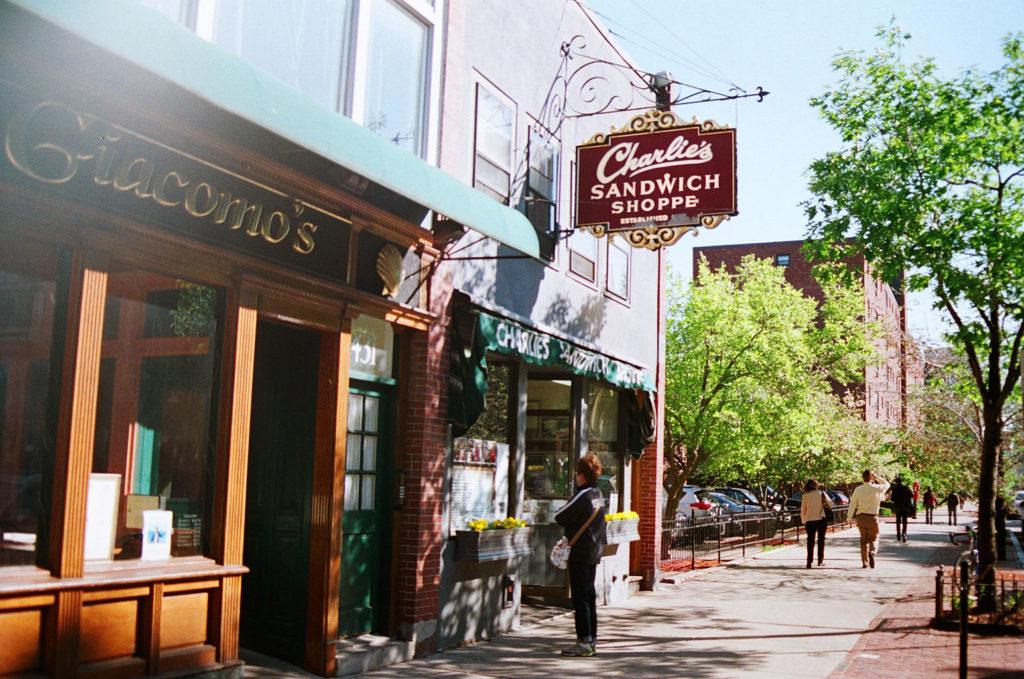By Maxim Tamarov, news editor
On a sunny Monday afternoon, a hungry crowd gathered outside a tiny gray building with green awnings in Boston’s south end. A rectangular crimson sign with white lettering revealed the location to be Charlie’s Sandwich Shoppe, a soon-to-be closed Boston landmark.
Charlie’s is famous for being one of few eateries to serve African-Americans during the era of segregation, and for maintaining its welcoming family atmosphere and overall appearance since its debut in 1927. The Manjourides family, which has managed the store for two generations, announced the diner’s closing in a Twitter post on May 12.
“I’ve been here 61 years. From 12 years old,” Arthur Manjourides said in an interview over coffee. “It was a great ride — I enjoyed the customers.”
The restaurant had a large base of regular customers who relied on Charlie’s for breakfast and brunch menus, but it attracted visitors from afar at the recommendation of local hotels as well.
“I used to work down the street at the Sheraton Boston hotel,” Peter Down, a Revere native and first-time customer said. “One of the ladies who works there told me about [Charlie’s] last week.”
His experience was spurred by the many testimonies of acquaintances praising Charlie’s.
“A friend of mine came from [Missouri]. He was raving about it,” Down said. He was convinced by his out of town friend to also check out the throwback food joint. Another guy I bumped into was like, ‘You need to try the turkey hash,’ so I did. They mix it with potatoes and onions. Kind of like a mash.”
Indeed, Charlie’s had become famous for this dish. The family even adopted @TurkeyHash as their twitter tag for the restaurant. But more than turkey hash, Charlie’s was defined by its culture and reliable hospitality to all kinds of people.
“It was always a show out here — half the customers would be bad guys and half would be police. It was fun — the gangsters and this and that,” said Manjourides.
He remembered a few exciting stories from his reign over the sandwich shoppe.
“We had a gas explosion here – across the street. One of my customers — named Arthur Cooke — when we had the gas explosion he laid down on the sidewalk. Ambulance came and he got $3,000 in insurance money.”
Manjourides explained that “Cookie” (as Cooke was called by his friends) was a bookie who worked from a fruit shop next door. The store had an apple on the windowsill, but the neighborhood was well aware of the front.
As the store was closing for the day, Manjourides heartily said goodbye to each customer individually. He casually pointed out that the man who had just quit the store was a well-known writer for the New York Times. He is not the only celebrity to have frequented the shoppe.
“I remember Johnny Hodges,” Manjourides said of the saxophonist who famously performed alongside Duke Ellington. “He was a pain in the neck — always wanted lamb chops and this and that.”
Sammy Davis Jr. allegedly began his career tap dancing out front of the shoppe.
“Sammy, even when he became famous, would always come in to see us,” Manjourides said.
From musicians and performers to government officials and mafia members, Charlie’s was always a popular place to drop by and eat. It was the watering hole where cops and mobsters could sit side-by-side and enjoy a hearty meal without conflict.
“All the politicians used to come in,” Manjourides said. “It wasn’t so much a political place as much as it felt like home.”
Even for first-time diners, Charlie’s feels like home.
“[Charlie’s] is old school. Like [a diner from] one of those old movies — the lady behind the counter comes and refills your drinks,” said Down.
Mayor Thomas Menino and Governor Deval Patrick would come in to discuss projects. Al Gore came in when he was running for president. More recently, President Barack Obama paid the shoppe a visit.
“We had a ten minute warning. We were really busy [that day],” Manjourides said. “The secret service announced, ‘If you want to stay you can, but you can’t leave while he’s here.'”
When Obama approached, Manjourides’ wife was at the door. The president said he needed a hug and Mrs. Manjourides almost fainted, Arthur recalls.

Charlie Poulos founded the eponymous eatery in March of 1927. Christi Manjourides was hired in October of that same year and the two became partners. Charlie’s quickly became famous for being a color-blind food institution.
“Not that long ago, most places wouldn’t serve blacks — even Duke Ellington,” Manjourides explained. “They would perform in hotels but they couldn’t stay there.”
Because Charlie’s served black people, many white people avoided the establishment. In those days, Manjourides recalls, 90 percent of the customers were African-American. Over time, with gentrification of the area, the clientele changed, but Charlie’s friendly reputation remained.
“We still have older customers coming in who appreciated us because there was no prejudice on our parts towards them,” he said.
Charlie’s was later passed down to Christi’s children — Arthur and Chris Manjourides, Fontaine Anzalone, and Marie Fuller — who still run the shoppe today.
“It was never discussed not to [continue with the business],” Manjourides said of his decision to stay at Charlie’s.
The next generation, however, pursued different directions in life. Arthur’s son, Justin, is an assistant professor in Northeastern’s Bouvé College of Health Sciences.
“It was a difficult decision,” Manjourides said of shutting down Charlie’s. “But it would happen eventually … I’d rather go out on a high note.”
His next step is to move to the north shore. Although the family hasn’t decided on the fate of the building, he doesn’t feel like staying around the neighborhood after the Charlie’s he grew up with is gone.
“Maybe someone else will buy the place. Maybe even the name Charlie’s,” he said.
Photos courtesy Avery Robertson, news correspondent.















